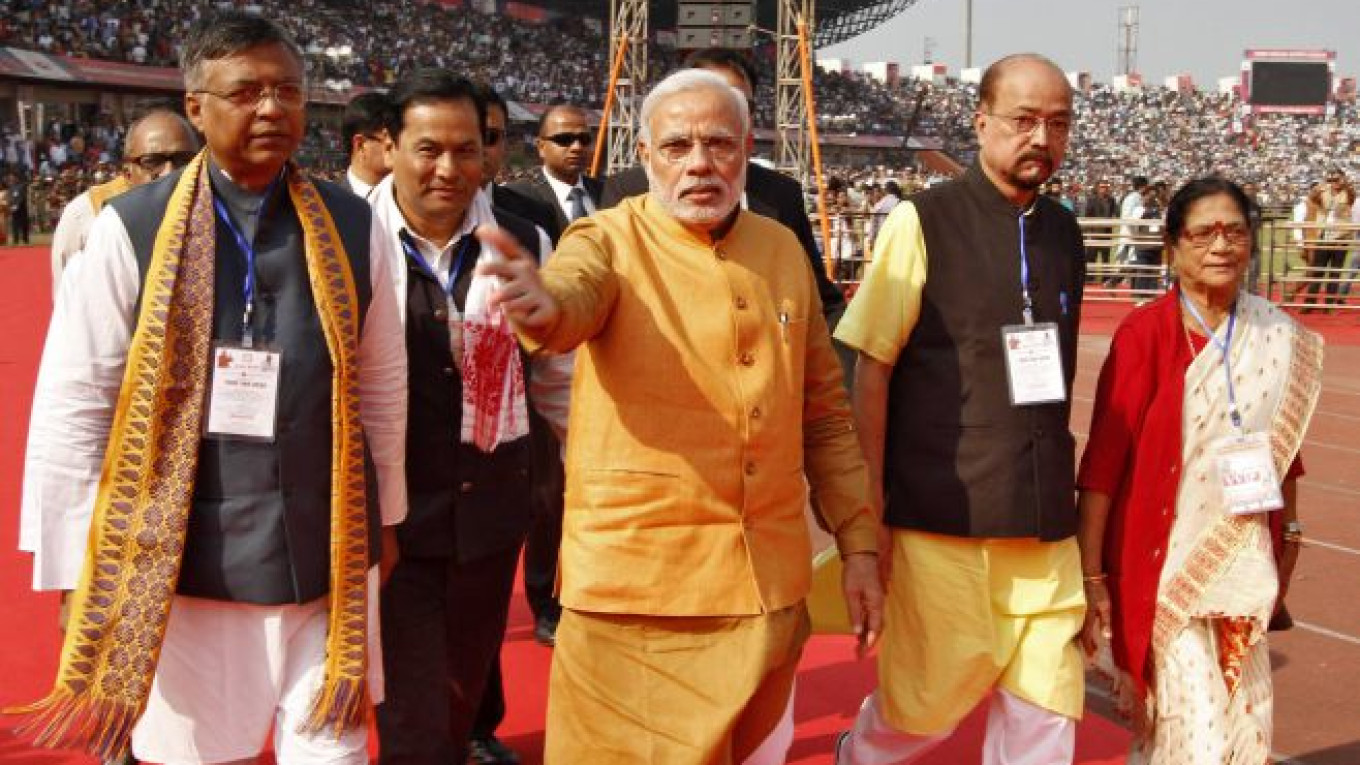India and Russia will strike an energy partnership when Prime Minister Narendra Modi hosts President Vladimir Putin on Thursday to prepare the way for two Siberian oil deals and chart a route for a first pipeline between the two countries.
But a joint "vision" document is likely to lack hard details, with terms still being thrashed out for India's ONGC Videsh to acquire an interest in Rosneft's Vankor and Yurubcheno-Tokhomskoye oil fields, officials and industry sources on both sides say.
There are doubts over the viability of proposed oil and gas pipeline routes that would either cross conflict-ridden Afghanistan and Pakistan — India's arch enemy — or mountainous tracts of inner China.
Russia, isolated by the West over its annexation of Crimea and backing of an armed uprising in eastern Ukraine, has a friendship with India that dates back to the Soviet era.
"In the present circumstances, when Europe is trying to isolate Russia, Putin wants to show that he has friends in the world," said Gulshan Sachdeva, head of the Center for European Studies at Jawaharlal Nehru University in New Delhi.
"Modi and Putin are similar leaders. They like to announce big schemes," Sachdeva added. "It might make sense to do so — whether or not they come to fruition is another matter."
New Delhi explicitly rules out joining Western sanctions against Russia although Modi has struck up an increasingly warm friendship with U.S. President Barack Obama since winning power in May, and will host the U.S. leader in January.
Putin has been a regular visitor to India since becoming president in 2000 but the trip will be a one-day affair. A proposal for him to address India's parliament was quietly dropped.
Russo-Indian trade, at $10 billion, is only one-ninth of the volume between Russia and China.
New Ties
Indian and Russian officials say the strategic declaration will encompass issues from defense to nuclear power and even diamonds, with state monopoly Alrosa keen to ramp up exports to India.
"The visit will solidify the political relationship; confirm Russia as India's principal purveyor of arms; and expand ties in other areas, such as nuclear energy," said Dmitry Trenin, director of the Carnegie Moscow Center.
State-controlled Rosneft, the world's largest listed oil firm by output, is strapped for cash due to Western sanctions, and is showing increased willingness to offer upstream projects to India.
But wrangling continues over the interest ONGC Videsh would get in Vankor, which is expected to reach peak output of 500,000 barrels per day in 2019.
Indian government sources say that Rosneft has offered a 10 percent stake in the Vankor operating company, but that New Delhi is pushing for a 25 percent interest that would allow ONGC Videsh to book equity barrels.
India is also seeking tax breaks on a proposed 49 percent stake in Yurubcheno-Tokhomskoye, a greenfield project in eastern Siberia, because under Russia's existing fiscal regime the field would lose money.
State oil firm Oil and Natural Gas Corp's overseas arm partners Rosneft and U.S. ExxonMobil in the Sakhalin-1 offshore energy project. ONGC also owns struggling Siberian producer Imperial Energy.
The aspiration to build a pipeline passage to India will be "there" in the joint Indo-Russian statement, a second Indian official said, but details remain sketchy.
Russia's Ambassador to India, Alexander Kadakin, told reporters that an export route via China's westernmost province of Xinjiang was under consideration but needed to be studied further due to challenging terrain.
Indian officials have pushed the idea of a $40 billion pipeline to pump Siberian gas to India, but even if it is practicable it would struggle to compete with tanker-shipped liquefied natural gas.
India imports 80 percent of the 4 million bpd of crude that it consumes daily, making an oil link a more promising option, yet proposals have so far failed to get off the drawing board.
Russia's Eastern Siberia-Pacific Ocean oil pipeline has a capacity of 1.6 million bpd, while state natural gas monopoly Gazprom is working to finalize a $400 billion deal to pump gas to China.
A Message from The Moscow Times:
Dear readers,
We are facing unprecedented challenges. Russia's Prosecutor General's Office has designated The Moscow Times as an "undesirable" organization, criminalizing our work and putting our staff at risk of prosecution. This follows our earlier unjust labeling as a "foreign agent."
These actions are direct attempts to silence independent journalism in Russia. The authorities claim our work "discredits the decisions of the Russian leadership." We see things differently: we strive to provide accurate, unbiased reporting on Russia.
We, the journalists of The Moscow Times, refuse to be silenced. But to continue our work, we need your help.
Your support, no matter how small, makes a world of difference. If you can, please support us monthly starting from just $2. It's quick to set up, and every contribution makes a significant impact.
By supporting The Moscow Times, you're defending open, independent journalism in the face of repression. Thank you for standing with us.
Remind me later.


